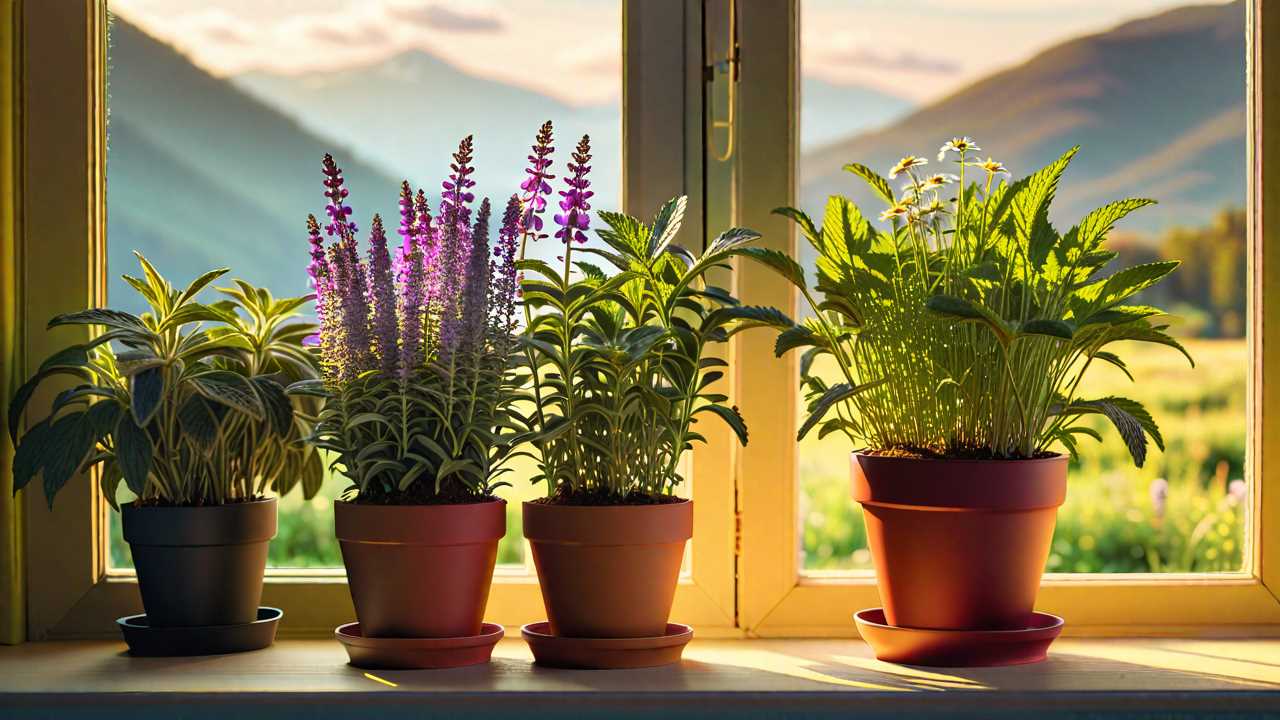
When it pertains to cultivating your own healing oasis, think of your home garden as a sanctuary of natural remedies. Imagine the satisfaction of plucking fresh herbs straight from your backyard to soothe ailments and boost wellness. As you consider which medicinal herbs to nurture, keep in mind their versatility and potency. Each herb has unique properties that can address a spectrum of health concerns, making them invaluable additions to your home apothecary.
Top Medicinal Herbs for Beginners
If you're new to growing medicinal herbs, consider starting with these top three beginner-friendly options. First up is Lavender, a versatile herb known for its calming properties and lovely fragrance. Lavender is relatively easy to grow, requiring well-draining soil and plenty of sunlight. You can use its flowers to make soothing teas or aromatic sachets to promote relaxation and improve sleep quality.
Peppermint is another fantastic choice for beginners. This refreshing herb is excellent for aiding digestion and relieving headaches. Peppermint thrives in moist soil and partial shade, making it a great addition to your indoor or outdoor herb garden. You can harvest its leaves to make invigorating teas or add flavor to culinary dishes.
Lastly, Chamomile is a must-have herb for any beginner herbalist. Chamomile is well-known for its calming effects and is commonly used to alleviate stress and promote better sleep. This herb prefers well-drained soil and full sun, making it a perfect herb to grow in pots or garden beds. Enjoy its delicate flowers in teas or infusions for a soothing bedtime ritual.
Healing Herbs for Stress Relief
Discover the calming benefits of these three potent medicinal herbs that can help you find relief from stress and anxiety.
- Lavender:
Lavender is well-known for its soothing aroma, which can help reduce stress and promote relaxation. You can harvest the flowers and leaves to make tea or use them in aromatherapy to create a calming atmosphere in your home.
- Chamomile:
Chamomile is a gentle herb that has been used for centuries to alleviate anxiety and promote better sleep. You can brew chamomile tea using the dried flowers or even apply chamomile essential oil to your pulse points for quick stress relief.
- Lemon Balm:
Lemon balm is a member of the mint family and is prized for its ability to reduce stress and improve mood. You can harvest the leaves to make a refreshing tea or create a homemade tincture to have on hand whenever you need a quick pick-me-up.
These herbs are easy to grow at home and can be a wonderful addition to your stress-relief toolbox.
Incorporate them into your daily routine to experience their calming effects and promote a sense of well-being.
Immune-Boosting Herbal Remedies
Uncover the potential of herbal remedies that can strengthen your immune system and improve your overall health and well-being.
If you're looking to boost your immune system naturally, consider growing herbs like echinacea, elderberry, and astragalus. Echinacea is well-known for its immune-boosting properties and can help your body fight off infections more effectively. Elderberry is rich in antioxidants and vitamins that support immune health, while astragalus has been used in traditional Chinese medicine to elevate immune function.
Additionally, don't overlook the power of garlic and ginger, which are easily grown at home. Garlic has antimicrobial and immune-stimulating effects, making it a great ally in warding off illnesses. Ginger, on the other hand, has anti-inflammatory and antioxidant properties that can help fortify your immune system.
Herbal Plants for Common Ailments
Consider the herbal plants that can effectively address common ailments and provide natural relief for various health issues. When growing a medicinal herb garden at home, it's essential to include plants that can assist with everyday health concerns.
Here are three herbal plants known for their beneficial properties in treating common ailments:
- Peppermint: Known for its soothing properties, peppermint is excellent for alleviating digestive issues such as indigestion, bloating, and gas. It can also help relieve headaches and muscle tension when used as a topical treatment or in teas.
- Lavender: Widely recognized for its calming effects, lavender is ideal for managing stress and promoting relaxation. It can also aid in improving sleep quality and reducing anxiety levels.
- Echinacea: Echinacea is a powerful immune-boosting herb that can help prevent and reduce the duration of colds and flu. It's commonly used to strengthen the body's natural defense mechanisms and fight off infections.
Frequently Asked Questions
Can Medicinal Herbs Be Grown Indoors?
Absolutely, medicinal herbs can thrive indoors with proper care. Select a sunny spot, guarantee good drainage, and water regularly. Popular choices include basil, mint, and lavender. Enjoy fresh herbs for teas, remedies, and cooking!
How Often Should Herbs Be Watered?
To guarantee healthy growth, water your herbs properly. Water frequency varies based on the type of herb, pot size, and environment. Generally, aim to keep the soil moist but not waterlogged. Check the soil regularly and adjust watering as needed.
Is It Safe to Use Homegrown Herbs for Children?
Before utilizing homegrown herbs for children, always seek advice from a healthcare professional to guarantee safety and proper dosage. Some herbs may not be suitable for children due to potential risks.
What Are the Best Herbs for Skin Conditions?
For skin conditions, consider growing soothing herbs like chamomile, calendula, and lavender. These herbs can help with inflammation, irritation, and promoting healing. Incorporate them into creams, oils, or teas for natural skin relief.
Can Herbs Be Grown in Small Living Spaces?
Living in a small space doesn't mean you can't grow herbs. Utilize vertical space with hanging planters. Herbs like mint, basil, and parsley thrive indoors. Provide sunlight and water, and enjoy fresh herbs year-round.
 SportsHollywoodLifestyleFashionHome & GardenTrendsPrivacy PolicyTerms And Conditions
SportsHollywoodLifestyleFashionHome & GardenTrendsPrivacy PolicyTerms And Conditions
